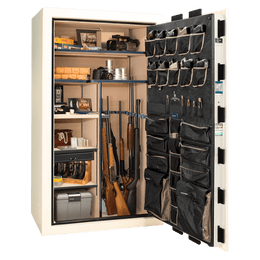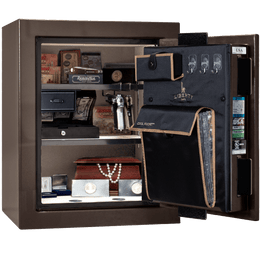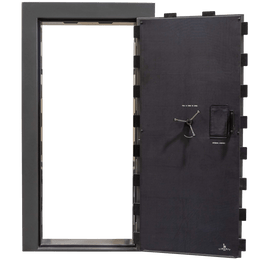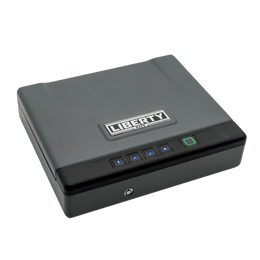As a safe manufacturing company, Liberty is all about security. Securing your valuables, firearms, and important documents from theft, fire, and unauthorized access is our bread and butter. But to keep your home and family as secure as they can be, you need to do more than just buy a quality, American-made safe (though that’s a great start).
We’ve prepared 16 top home security tips and best practices to keep your home and family more secure. A determined, professional thief is hard to stop in all cases, but studies show most home burglars are “thieves or opportunity” or amateur crooks. Have a look at our list and see if there are some areas in which you can improve your personal home security setup.
Top home security tips for today’s homeowner
-
When you move into a new house (or lose a key), change all the locks
This may seem like a no-brainer, but you’d be surprised how many people neglect this simple precaution due to expense or convenience. You don’t want anyone but you having a key to your home. Along these same lines, if you lose a key, change your locks immediately.
-
Don’t give your house key or security/door codes to anyone you don’t trust with your life
Giving a key copy or leaving a “hide-a-key” for the babysitter or your kids, friends, cleaners, etc. can be asking for trouble. Thieves may watch people entering your home during the day or after school, and can scope out the location of a hidden key, or steal a copied key for use later. Be VERY careful to whom you give access to your home.
If you employ house cleaners that enter while you’re away, triple-check their references, reviews, and recommendations. You’re giving complete access to your home to someone you don’t know well. Don’t take it lightly.
-
Actually, lock up your home every time you leave
“Oh, we live in a good neighborhood” is an oft-used phrase that gets people in trouble. Thieves often drive around “good” neighborhoods watching for open garages, open windows, and trying doors to see if they can get in. Get into the habit of locking your home securely whenever you leave, even if it’s just for a few minutes. This includes closing the garage and shutting/securing the windows. Make sure your kids know the rules and follow them.
-
Consider an electronic home security system or “smarthome”
A home monitoring/alarm system isn’t for everyone for various reasons, but they can be literal lifesavers. Today’s wifi-enabled security systems like Ring and others do a lot more than call the cops if a window or door is breached. Depending on your plan and optional equipment, you can monitor babysitters or pets, check who’s at the door and respond (even if you’re not home), turn lights and electronic equipment on or off, lock or unlock your home remotely, automatically alert the fire department in case of smoke, and much more.
However, an alarm/security system is only as good as the person using it. You have to remember to always turn on the alarm when you leave, and it’s a minor hassle to have to turn it off every time you enter.
Additionally, a faulty alarm system that goes off frequently can desensitize your neighbors. If you have an audible alarm system that’s too sensitive or is defective, get it repaired or replaced as soon as possible. As anyone who has lived near a faulty car alarm knows, it soon becomes background noise.
However, as noted above, the modern “App-based” systems are much more convenient and user-friendly than some hard-wired traditional security systems.
Even if you don’t want to mess with or pay for a full-blown alarm and monitoring service, consider placing a “protected by [X security company” sign in your yard. Furthermore, a “porch pirate” looking to snatch a package off your doorstep may be dissuaded by a visible security camera by your front door. This brings us to our next tip.
-
Arrange packages to be delivered while you’re home, or ask a trusted neighbor to pick them up
210 million packages were stolen from porches last year, according to a New York Post survey. 64% of Americans were victims of package theft in 2021 — a 36% increase from the previous year. And we apparently don’t learn quickly, as 53% of survey respondents had multiple packages stolen.
Some theorize that the increase is due to a greater number of people shopping remotely due to the COVID pandemic and related issues, but whatever the reason, it’s important that you try not to leave packages sitting on your doorstep for long. This is a huge signal to thieves that you’re not home (and of course exposes you to the aforementioned “porch pirates” who specialize in just grabbing whatever Amazon box they find in front of people’s homes).
Some people buy or build parcel drop boxes where delivery people can place parcels and packages on your porch while keeping them secure from package thieves (while avoiding sending a visible “I’m not home” signal to home burglars).
-
Upgrade your doors, locks, and windows
Spring bolts are susceptible to break-ins, even by amateurs. Make sure your home’s external doors have ANSI Grade I, double-cylinder deadbolt locks installed, and use quality doors with hardened latch plates and hinges.
Make sure the screws securing your door hinges are long enough to go through to the studs/framing.
Also, consider replacing glass-panel doors and sliding glass doors with solid doors. It’s easy for thieves to break out a glass panel, reach in, and unlock a door from the inside (or to break a glass sliding door entirely).
Do your research on the best security locks for windows and upgrade yours if necessary. And, as noted above, remember to actually latch your windows when you’re not home.
You might consider adding burglar-resistant glass windows and/or bars on your first-floor windows.
In the meantime, you can add a level of security for sliding doors/windows by cutting a thick dowel or length of metal pipe that will lay in the track at the bottom of the door/window, and prevent it from being opened until the dowel/pipe is removed from the inside.
-
Install motion-sensitive exterior lighting
No thief likes being seen while he’s breaking into your home. Motion-activated exterior lighting around your home’s exterior can go a long way toward deterring nighttime prowlers. Just make sure to keep your pets inside at night (or at least out of the range of the sensors) so you don’t drive your neighbors crazy with your floodlights turning on and off frequently.
-
Use timers to turn on interior lights or appliances when you’re away
Most burglars will avoid homes that appear occupied. So if you’re out for the day (or a few days), consider installing timers for lamps, televisions, radios, etc. so it looks and sounds like your house isn’t empty. If you still have an old-fashioned hard-wired phone with a ringer/bell, either unplug it or turn the ring volume down so baddies can’t hear your phone ringing all day and not being answered.
-
For extended away times, arrange for your mail, newspaper, trash, and lawn/leaf/snow care
If you’re planning an extended trip or vacation and your home will be empty, make sure you either arrange with a trusted friend/neighbor to pick up your mail or have the post office hold it for you. Pause any newspaper deliveries (if you’re one of the last hold-outs for this service). Also, a well-lit and seemingly occupied home won’t fool many burglars if there’s old, crusty snow all over your driveway and sidewalk, leaves, or a neglected lawn. So arrange for leaf/snow removal and lawn care while you’re absent.
Also, ask friends or neighbors to use your garbage/recycle bins while you’re away, move them to the curb for pickup, and return them afterward. If yours are sitting empty and unused while your neighbors’ are at the curb, a keen-eyed burglar might take a second look at your home.
If you have two vehicles, consider leaving one in the driveway rather than inside your garage. A car in the driveway makes a home appear occupied. If you can’t do this, consider asking a neighbor to park in your driveway while you’re gone.
-
Consider getting a dog, or pretend you have one
Yep, we said, “pretend you have one.” A dog (even a small one) can be a good deterrent for potential burglars. But if you just can’t manage a dog, you can leave pretend clues to your big, mean, Rottweiler’s existence, like a leash or dog toys on the porch or in the yard, “beware of the dog” signs, a dog bowl, or even a doghouse somewhere visible.
This may not fool smarter crooks, but it might be enough to dissuade some potential thieves, particularly any who have “had a bad experience” with dogs.
-
Don’t post your vacation pics on social media until you’re home
This may not even occur to many people, but posting your tasty beach-sunset pics on the ‘gram can be a big invitation to burglars whose friends-of-friends follow you. If you’re posting daily updates of your family vacation on social media, it’s a good bet you’re not at home looking after your dwelling and its contents. Wait until you’re home.
-
If your time away from home has been publicized online, consider hiring a house-sitter
If you’re traveling to attend a wedding or funeral which has been publicized in the newspaper or social media, ask your neighbors to be extra vigilant or consider hiring a house-sitter while you’re away. Some burglars watch these sources to find homes whose owners are attending these types of events.
-
Keep bushes, shrubs, and trees away from your doors and windows
As we mentioned above, baddies don’t like to be seen doing their bad stuff. If a burglar can hide in the shadows of a bush while trying to break in a window or jimmy a door lock, all the better for them. Plan your property landscaping so potential thieves don’t have places to hide, and if it’s too late for that, trim/prune back any branches and leaves that provide cover near your home.
-
Be skeptical of anyone who comes to your door
Professional burglars sometimes use the cover of a utility worker, cable/phone company installer, or other “legitimate” person to scope out potential homes to rob. When someone comes to your door, ask for ID (slide it under the door if it will fit), and if anything seems “off,” call the main office in your area to confirm.
Also, if anyone comes to your door asking to use your phone for an emergency or to call a tow truck, don’t let them in. Make the call yourself. Bad guys like to take advantage of nice people who just want to help.
-
Use the “lockout” feature on your garage door opener, and mask over any windows
Most garage door panels now offer a manual “lockout” setting that won’t allow thieves with frequency scanners to open your garage door, even if they learn the PIN to open your garage from the outside panel. If yours doesn’t have this feature, consider upgrading.
An empty garage is a clue that your home may be unoccupied. Install drapes or window coverings on exterior windows that give outsiders a view into your garage, and if your garage has glass panels, paint over them or use masking material on the inside.
If your garage door runs on exposed tracks/rollers, you can help prevent unauthorized entry by installing a heavy-duty C-clamp to the track just above a wheel. (Just be sure to remove it before you try to open your garage door!)
-
Keep an accurate inventory of your valuables, and store them in a quality, fire-resistant safe
Make a regular habit of adding new items you purchase to your inventory list and include photographs of the items if possible. Also note any model and serial numbers for electronics, firearms, watches, etc.
This list should be secured in multiple locations (a hard copy in your safe, and electronic copies on backup hard drives and cloud-based backup services) so you can provide it to your insurance company as well as law enforcement in case of loss.
One of the best things you can do to keep your valuables and/or firearms secure is to buy a quality, American-made Liberty safe. Liberty offers multiple models at different price points and security levels, but all provide significant protection against fire and break-in.
You should install your safe somewhere that makes it difficult for potential thieves to move it, and, ideally, bolt it down to floor joists or concrete (with moisture barrier) where possible. Keeping a safe in your garage where it might easily be dragged away by a truck and chains is a bad idea.
Be careful whom you tell about your safe (much as you may want to show your pride in ownership), and whom you let see it. Contractors, friends, kids’ friends, cleaning service workers, and others might casually mention “the big safe” in your library or den, and that word can spread around to crooks.
There you have it… our list of the 16 top tips for improving home security. We’ll bet you found one or more that made you go, “Hmmmm.” Stay safe out there!







